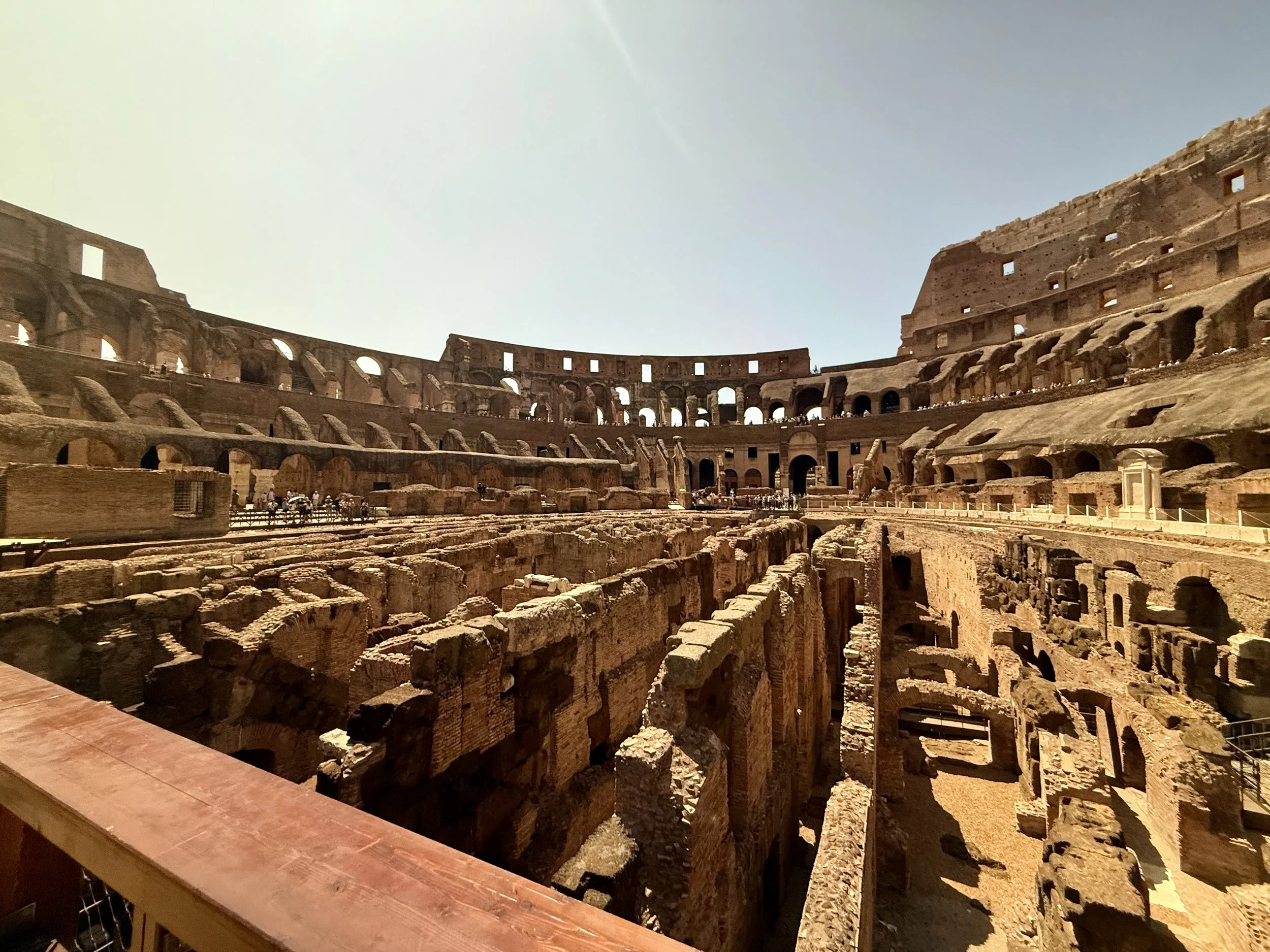Rome-The Colosseum
The Colosseum: Bucket List, Blazing Heat, and Smiles (Mostly) on the Inside
Gladiators we salute you!
Touring the Colosseum in Rome was always on our family’s bucket list—right up there with eating gelato on the Spanish Steps and pretending we’re in a scene from Gladiator. So when we finally snagged tickets for June 25th, we were pumped. The only catch? It was 91°F outside and a toasty 104°F inside. Let’s just say, if you watch the video, the smiles are definitely there… but mostly on the inside. (Pro tip: When you’re soaked through to your socks, “la dolce vita” takes on a whole new meaning.)
We’d driven all the way from the dreamy hills of Val d’Orcia, knowing full well the heat was coming for us. Thanks to Bonnie’s hard work and diligent planning, we managed to secure the only tour slot available—right in the heart of the afternoon sun. John was a little disappointed we couldn’t climb to the upper levels, but honestly, I think we all secretly thanked the Roman gods for that small mercy. If you look closely, you’ll see Bonnie up ahead, practically dragging John and me along as we trailed 300 yards behind, melting faster than gelato in the sun.
Still, some things are worth sweating for. Our family has a handful of movies that we drop everything to watch—National Treasure, Da Vinci Code (Rotten Tomatoes, don’t @ us), Battleship, and of course, Gladiator. So visiting the Colosseum wasn’t just a tour; it was a pilgrimage.
Did You Know? The Colosseum’s Real Name
Here’s a fun fact to distract you from your sunburn: The Colosseum was originally called the Flavian Amphitheatre (Amphitheatrum Flavium), after the Flavian dynasty of Roman emperors who built it. “Colosseum” came later, thanks to a massive statue of Nero that once stood nearby. (Imagine if Yankee Stadium was called “The Big Babe” just because of a statue out front.)
Who Built It, and How Long Did It Take?
Construction kicked off under Emperor Vespasian around 70–72 AD and wrapped up under his son Titus by 80 AD. That’s about 8–10 years—faster than most kitchen renovations. The Colosseum could fit over 50,000 fans, all eager for some ancient action.
What Went Down in the Arena?
Think of it as the original “must-see TV”:
Gladiator battles—the real deal, not just Russell Crowe.
Animal hunts—lions, tigers, and (sometimes) bears.
Mock naval battles—yes, they actually flooded the arena for ship fights. (No, we didn’t get to see that, but we did feel like we were swimming by the end.)
Dramatic re-enactments and public spectacles—because the Romans never did anything halfway.
The (Literally) Coolest Fact: Water Battles
Yep, the Colosseum once doubled as a giant pool for mock sea battles, called naumachiae. Early on, they’d fill the arena with water and stage epic naval showdowns. Eventually, they built underground tunnels for animals and stage magic, so the waterworks stopped—but it’s proof the Romans knew how to put on a show.
Engineering That Still Wows
From the retractable awning (the velarium) to the maze of tunnels below, the Colosseum is a marvel. Even on a day so hot our shoes could’ve doubled as steamers, it was jaw-dropping to see what’s still standing after nearly 2,000 years.
Final tip: When you finally stagger out, sweat-soaked and squinting, do as the Romans do—find the nearest Spritz or cold beer. You’ve earned it.
It sure was a hot day.



